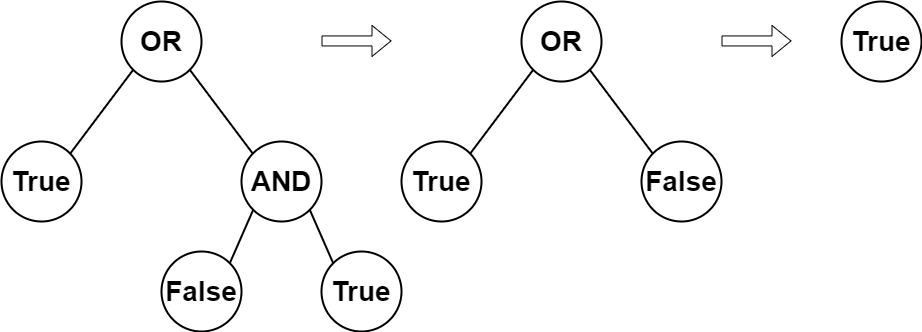2331. Evaluate Boolean Binary Tree
Description
You are given the root of a full binary tree with the following properties:
- Leaf nodes have either the value
0or1, where0representsFalseand1representsTrue. - Non-leaf nodes have either the value
2or3, where2represents the booleanORand3represents the booleanAND.
The evaluation of a node is as follows:
- If the node is a leaf node, the evaluation is the value of the node, i.e.
TrueorFalse. - Otherwise, evaluate the node's two children and apply the boolean operation of its value with the children's evaluations.
Return the boolean result of evaluating the root node.
A full binary tree is a binary tree where each node has either 0 or 2 children.
A leaf node is a node that has zero children.
Example 1:

Input: root = [2,1,3,null,null,0,1] Output: true Explanation: The above diagram illustrates the evaluation process. The AND node evaluates to False AND True = False. The OR node evaluates to True OR False = True. The root node evaluates to True, so we return true.
Example 2:
Input: root = [0] Output: false Explanation: The root node is a leaf node and it evaluates to false, so we return false.
Constraints:
- The number of nodes in the tree is in the range
[1, 1000]. 0 <= Node.val <= 3- Every node has either
0or2children. - Leaf nodes have a value of
0or1. - Non-leaf nodes have a value of
2or3.
Solutions
Solution: Depth-First Search
- Time complexity: O(n)
- Space complexity: O(n)
JavaScript
js
/**
* Definition for a binary tree node.
* function TreeNode(val, left, right) {
* this.val = (val===undefined ? 0 : val)
* this.left = (left===undefined ? null : left)
* this.right = (right===undefined ? null : right)
* }
*/
/**
* @param {TreeNode} root
* @return {boolean}
*/
const evaluateTree = function (root) {
const evaluateMap = {
0: false,
1: true,
2: (a, b) => a || b,
3: (a, b) => a && b,
};
const evaluateNode = node => {
const { val } = node;
const evaluate = evaluateMap[val];
if (val < 2) return evaluate;
const left = evaluateNode(node.left);
const right = evaluateNode(node.right);
return evaluate(left, right);
};
return evaluateNode(root);
};